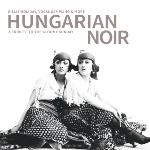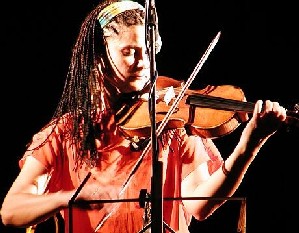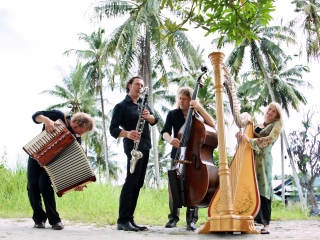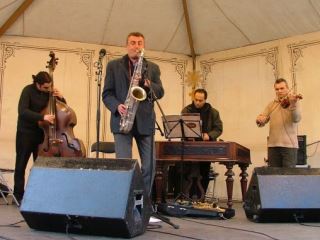FolkWorld #60 07/2016
Szomorú Vasárnap - Gloomy Sunday
Szomorú Vasárnap száz fehér virággal,
Vártalak, kedvesem, templomi imával,
Álmokat kergető vasárnap délelőtt,
Bánatom hintaja nélküled visszajött.
Azóta szomorú mindig a vasárnap,
Könny csak az italom, kenyerem a bánat...
Szomorú vasárnap.
Utolsó vasárnap, kedvesem, gyere el;
Pap is lesz, koporsó, ravatal, gyászlepel,
Akkor is virág vár, virág és - koporsó,
Virágos fák alatt utam az utolsó.
Nyitva lesz szemem, hogy még egyszer lássalak,
Ne félj a szememtől, holtan is áldalak...
Utolsó vasárnap.
On a sad Sunday with a hundred white flowers,
I was waiting for you, my dear, with a church prayer,
That dream-chasing Sunday morning,
The chariot of my sadness returned without you.
Ever since then, Sundays are always sad,
tears are my drink, and sorrow is my bread...
Sad Sunday.
Last Sunday, my dear, please come along,
There will even be priest, coffin, catafalque, hearse-cloth.
Even then flowers will be awaiting you, flowers and coffin.
Under blossoming trees my journey shall be the last.
My eyes will be open, so that I can see you one more time,
Do not be afraid of my eyes as I am blessing you even in my death.
Last Sunday.
Billie Holiday Version
Sunday is gloomy, my hours are slumberless;
Dearest, the shadows I live with are numberless;
Little white flowers will never awaken you,
Not where the black coach of sorrow has taken you;
Angels have no thought of ever returning you;
Would they be angry if I thought of joining you?
Gloomy Sunday.
Gloomy is Sunday; with shadows I spend it all;
My heart and I have decided to end it all;
Soon there'll be candles and prayers that are sad, I know,
Let them not weep, let them know that I'm glad to go.
Death is no dream, for in death I'm caressing you;
With the last breath of my soul I'll be blessing you.
Gloomy Sunday.
Dreaming, I was only dreaming;
I wake and I find you
Asleep in the deep of my heart, dear.
Darling, I hope that my dream never haunted you;
My heart is telling you how much I wanted you.
Gloomy Sunday.
 Listen & Watch Gloomy Sunday from:
Rezső Seress, Björk, Sarah Brightman, Sarah McLachlan,
Marilyn Monroe, Heather Nova, Sinéad O'Connor
Listen & Watch Gloomy Sunday from:
Rezső Seress, Björk, Sarah Brightman, Sarah McLachlan,
Marilyn Monroe, Heather Nova, Sinéad O'Connor
Gloomy Sunday
Songs That Made History:
On the occasion of the first WOMEX in Eastern Europe in Budapest in 2015,
Piranha Records had invited to submit interpretations of
the world’s deadliest song, a musical composition so lethal that merely to hear it hummed may induce suicidal tendencies,
the Hungarian Szomorú Vasárnap (Gloomy Sunday).
"Gloomy Sunday", also known as the "Hungarian Suicide Song", is a song composed by Hungarian pianist and composer Rezső Seress and published in 1933.
The original lyrics were titled Vége a világnak (The world is ending) and were about despair caused by war, ending in a quiet prayer about people's sins. Poet László Jávor wrote his own lyrics to the song, titled Szomorú vasárnap (Sad Sunday), in which the protagonist wants to commit suicide following his lover's death. The latter lyrics ended up becoming more popular while the former were essentially forgotten. The song was first recorded in Hungarian by Pál Kalmár in 1935.

WARNING: This music may be hazardous to your health. Listener precaution is advised. --
The Hungarian song
Szomorú Vasárnap (engl.
Gloomy Sunday),
composed by pianist Rezső Seress in 1933, is notorious because
it is accused of having initiated a wave of suicides in Budapest (including Rezső Seress).
Since the 1930s dozens of versions have been published worldwide,
Billie Holiday made it immortal in 1941.
The compilation
Hungarian Noir - A Tribute to the Gloomy Sunday gathers ten brand new versions of this spooky song,
featuring Hungarian cimbalon virtuoso Kálmán Balogh, Polish pop diva Kayah,
US-Brazilian bluegrass crossover Matuto, Argentinian accordionist Chango Spasiuk,
Brazilian rap singer GOG, Cuban outfits Vocal Sampling and Manolito Simonet y su Trabuco
and singer Glenda López, Columbian dance band Bambarabanda and Mozambique's Wazimbo, plus
remastered original versions of Pál Kalmár and Billie Holiday.
Melancholy straight and pure!
 Various Artists "Hungarian Noir - A Tribute to the Gloomy Sunday" (CD, Piranha Records, 2016
Various Artists "Hungarian Noir - A Tribute to the Gloomy Sunday" (CD, Piranha Records, 2016
"Gloomy Sunday" was first recorded in English by Hal Kemp in 1936, with lyrics by Sam M. Lewis, and was recorded the same year by Paul Robeson, with lyrics by Desmond Carter. It became well-known throughout much of the English-speaking world after the release of a version by Billie Holiday in 1941. Lewis's lyrics referred to suicide, and the record label described it as the "Hungarian Suicide Song". There is a recurring urban legend which claims that many people have committed suicide while listening to this song.
Writing and background
The song was composed by Rezső Seress while living in Paris, in an attempt to become established as a songwriter in late 1932. The original musical composition was a piano melody in C-minor, with the lyrics being sung over it. Seress wrote the song at the time of the Great Depression and increasing fascist influence in the writer's native Hungary, although sources differ as to the degree to whether his song was motivated by personal melancholy rather than concerns about the future of the world. The basis of Seress's lyrics is a reproach to the injustices of man, with a prayer to God to have mercy on the modern world and the people who perpetrate evil. There are some suggestions that the words of "Vége a világnak" were in fact not written until World War II itself and not copyrighted until 1946.
Seress initially had difficulty finding a publisher, mainly due to the unusually melancholy nature of the song. One potential publisher stated:
| “ |
It is not that the song is sad, there is a sort of terrible compelling despair about it. I don't think it would do anyone any good to hear a song like that. |
” |
The song was published as sheet music in late 1933, with lyrics by poet László Jávor, who was inspired by a recent break-up with his fiancée. According to most sources, Jávor rewrote the lyrics after the song's first publication, although he is sometimes described as the original writer of its words. His lyrics contained no political sentiments, but rather were a lament for the death of a beloved and a pledge to meet with the lover again in the afterlife. This version of the song became the best known, and most later rewritings are based around the idea of lost love.
Urban legends
There have been several urban legends regarding the song over the years, mostly involving it being allegedly connected with various numbers of suicides, and radio networks reacting by purportedly banning the song. However, most of these claims are unsubstantiated.
Press reports in the 1930s associated at least nineteen suicides, both in Hungary and the United States, with "Gloomy Sunday", but most of the deaths supposedly linked to it are difficult to verify. The urban legend appears to be, for the most part, simply an embellishment of the high number of Hungarian suicides that occurred in the decade when the song was composed due to other factors such as famine and poverty. No studies have drawn a clear link between the song and suicide.
In January 1968, some thirty-five years after writing the song, its composer did commit suicide.
The BBC banned Billie Holiday's version of the song from being broadcast, as being detrimental to wartime morale, but allowed performances of instrumental versions. However, there is little evidence of any other radio bans; the BBC's ban was lifted by 2002.
Iva Bittová @ FolkWorld:
FW#32,
#33
www.bittova.com
Quadro Nuevo @ FolkWorld:
FW#37,
#43,
#47,
#48
#48,
#52,
#57
www.quadronuevo.de
Sinéad O'Connor @ FolkWorld:
FW#24,
#52,
#55,
#58,
#59
www.sinead-oconnor.com
Matuto @ FolkWorld:
FW#47,
#51,
#56
www.matutomusic.com
Marisssa Nadler @ FolkWorld:
FW#48,
#48
#54,
#55
www.marissanadler.com
Kálmán Balogh @ FolkWorld:
FW#21,
#35,
#48
www.kalmanbalogh.hu
Chango Spasiuk @ FolkWorld:
FW#39,
#39
www.changospasiuk.com.ar
Later recordings and notable performances
The song's notoriety contributed towards many other notable artists later recording the song, including:
- 1935 (1935): Katalin Karády
- 1936 (1936): Paul Whiteman & Johnny Hauser
- 1936 (1936): Damia (in French as "Sombre dimanche")
- 1936 (1936): Noriko Awaya (in Japanese as "Kurai Nichiyōbi (暗い日曜日)")
- 1936 (1936): Hildegarde
- 1936 (1936): Agustín Magaldi (in Spanish as "Triste domingo"
- 1937 (1937): Pyotr Leshchenko (in Russian as "Мрачный воскресный день")
- 1940 (1940): Artie Shaw + Pauline Byrne
- 1941 (1941): Billie Holiday
- 1941 (1941): Mimi Thoma (in German as "Einsamer Sonntag")
- 1946 (1946): Luis Russell + Lee Richardson
- 1958 (1958): Mel Tormé
- 1959 (1959): Eila Pellinen (in Finnish as "Surullinen sunnuntai")
- 1961 (1961): Sarah Vaughan
- 1961 (1961): Lorez Alexandria
- 1962 (1962): Ketty Lester
- 1962 (1962): Lou Rawls
- 1967 (1967): Carmen McRae
- 1968 (1968): Genesis (the Los Angeles psychedelic rock band, not the UK progressive rock band)
- 1969 (1969): Ray Charles
- 1969 (1969): Big Maybelle (on Saga of the Good Life & Hard Times)
- 1972 (1972): Viktor Klimenko (in Russian as "Ona pred ikonoi", Arseny Golenishchev-Kutuzov lyrics)
- 1975 (1975): Jimmy Witherspoon (on Spoonful)
- 1977 (1977): Etta Jones (on My Mother's Eyes)
- 1980 (1980): Lydia Lunch (on Queen of Siam album)
- 1981 (1981): Elvis Costello (Trust) (Sam M. Lewis, Rezső Seress)
- 1982 (1982): Associates (Sulk) (Sam M. Lewis, Rezső Seress) (singer Billy Mackenzie committed suicide in 1997)
- 1983 (1983): Marc Almond (Torment and Toreros) (Sam M. Lewis, Rezső Seress)
- 1984 (1984): Peter Wolf (Lights Out) (Sam M. Lewis, Rezső Seress)
- 1985 (1985): Harri Marstio (in Finnish, lyrics Reino Helismaa)
- 1986 (1986): Christian Death (Atrocities) (Sam M. Lewis, Rezső Seress)
- 1987 (1987): Dead Milkmen (as a bridge in their song "Blood Orgy of the Atomic Fern")
- 1987 (1987): Serge Gainsbourg (French version)
- 1987 (1987): Abbey Lincoln
- 1987 (1987): Marianne Faithfull
- 1991 (1991): Vlado Kreslin (Bela nedelja (Namesto koga roža cveti album)) (Vlado Kreslin lyrics)
- 1991 (1991): Hot Club de Norvège (The Best of Hot Club de Norvege with Ivar Brodahl On Violin)
- 1992 (1992): Diamanda Galás (The Singer) (Desmond Carter lyrics)
- 1992 (1992): Sinéad O'Connor
- 1992 (1992): Woody Herman
- 1994 (1994): Anton LaVey (Released it in his 10" "Strange Music")
- 1995 (1995): Satan's Cheerleaders
- 1995 (1995): Creed Taylor Orchestra
- 1996 (1996): Sarah McLachlan (using Sam M. Lewis lyrics; from the Rarities, B-Sides, and Other Stuff album)
- 1998 (1998): Danny Michel (from the "Clear" album)
- 1999 (1999): The Smithereens (on God Save The Smithereens album)
- 1999 (1999): Detlef Petersen (Orchestral version - soundtrack of "Ein Lied von Liebe und Tod - Gloomy Sunday")
- 1999 (1999): Ben Becker (soundtrack of Ein Lied von Liebe und Tod - Gloomy Sunday – A Song of Love and Death)
- 1999 (1999): Erika Marozsán (soundtrack of Ein Lied von Liebe und Tod - Gloomy Sunday – A Song of Love and Death)
- 2000 (2000): Kronos Quartet (instrumental for string quartet)
- 2000 (2000): Ricky Nelson (Legacy album)
- 2000 (2000): Sarah Brightman (using Sam M. Lewis lyrics; on La Luna)
- 2001 (2001): Heather Nova (on the South album)
- 2001 (2001): Iva Bittová
- 2001 (2001): NRG Ensemble (The Hal Russell Story)
- 2002 (2002): Hans Koller (Lovers and Strangers)
- 2004 (2004): Vlado Kreslin
- 2004 (2004): Branford Marsalis Quartet
- 2005 (2005): Venetian Snares (under Hungarian title "Öngyilkos vasárnap", literally meaning "Suicidal Sunday", incorporating a sample of Billie Holiday's 1941 rendition)
- 2005 (2005): Jaurim in the album 靑春禮瓚 (청춘예찬, Ode to Youth)
- 2005 (2005): Karin Krog
- 2005 (2005): Herbie Mann (Herbie Mann String Album)
- 2006 (2006): Eminemmylou on the country rap album Muthabanjo
- 2006 (2006): Mickey Baker
- 2006 (2006): Peter Herbert
- 2006 (2006): Lucía Jiménez
- 2006 (2006): Greta Keller
- 2006 (2006): London Concertante
- 2006 (2006): Quadro Nuevo
- 2007 (2007): Lajos Dudas
- 2008 (2008): Page Cavanaugh
- 2009 (2009): Emilie Autumn (Billie Holiday lyrics - first 2 verses only)
- 2009 (2009): Ryan “Chance” Bascombe (Hip Hop Remix - with a Billie Holiday Sample)
- 2010 (2010): Leander Rising "Szomorú vasárnap"(Hungarian metal band)
- 2010 (2010): Pallbearer (band) (demo)
- 2010 (2010): Björk (Alexander McQueen Commemorial)
- 2011 (2011): Marissa Nadler and Ryan Lee Crosby
- 2012 (2012): Sarasvatī (on Mirror album)
- 2013 (2013): Dax Riggs (live performances)
- 2013 (2013): Diamant (made specially for Halloween 2013)
- 2014 (2014): Angelina Jordan (Norwegian Talent Show)
- 2015 (2015): Yudi Suryono (X Factor Indonesia)
- 2015 – Epikurian (Remix-Noise Music Version, on Soundcloud)
Legacy
The song is featured in several scenes of Steven Spielberg's 1993 film Schindler's List.
The 1999 German-Hungarian film Ein Lied von Liebe und Tod tells a fictional story about the creation of the song, depicting a love triangle during World War II. Heather Nova covers the song in the closing credits.
The song inspired the 2006 movie The Kovak Box, in which a writer is trapped on the island of Mallorca with people who are injected with a microchip that causes them to commit suicide when they hear "Gloomy Sunday". The song plays during the movie, sung by the actress Lucía Jiménez. A music video from the cover was released as part of the movie promotion. The song also features on the soundtrack of Wristcutters: A Love Story, performed by Artie Shaw.
In 2008, Belgian artist Marieke Van Wuytswinkel used a sample of Gloomy Sunday in her work A Natural Morning. The song and urban legend appeared in the Taiwanese drama Gloomy Salad Days. Actress Serena Fang recorded a version of "Gloomy Sunday" that was included in the soundtrack released on 19 November 2010. Gloomy Sunday was featured in a 2012 television episode of Dark Matters: Twisted But True.
From Wikipedia, the free encyclopedia
[en.wikipedia.org/wiki/Gloomy_Sunday].
Wikipedia® is a registered trademark of the Wikimedia Foundation, Inc., a non-profit organization.
Text is available under the Creative Commons Attribution-ShareAlike License.
Date: June 2016.
Photo Credits:
(1) Hungarian Noir - A Tribute to the Gloomy Sunday,
(2) Iva Bittová,
(3) Quadro Nuevo,
(4) Sinéad O'Connor,
(5) Matuto,
(6) Marisssa Nadler,
(7) Kálmán Balogh,
(8) Chango Spasiuk,
(9) Billie Holiday
(unknown/website).
FolkWorld - Home of European Music
 Layout & Idea of FolkWorld © The Mollis - Editors of FolkWorld
Layout & Idea of FolkWorld © The Mollis - Editors of FolkWorldListen & Watch Gloomy Sunday from: Rezső Seress, Björk, Sarah Brightman, Sarah McLachlan, Marilyn Monroe, Heather Nova, Sinéad O'Connor










